Isaac, Gener and Katrina: Climate Change in Action
By Dady Chery
Haiti Chery
Like a hulking giant, Isaac has stomped across the Caribbean at practically human speed, for days. Ten miles per hour, 14 mph, and Isaac continues its march northwest and west-northwest, for nearly one week, as if for a rendez-vous. With whom?
Haiti could not have been tapped more gently, although at least 24 people have died. The propaganda is in full swing to credit Isaac with the collapsed Haitian agriculture on which USAID has labored for years. No. Give credit where credit is due. USAID should take a bow.
A possible resurgence of cholera is also being predicted from Isaac’s passage, although this is hardly the logical outcome of a tropical storm that has brought Haiti a gift of vast quantities of naturally distilled water. If cholera reappears, it will most likely be due to the contamination of the country’s waters with hospital wastes or the sale of uninspected emergency bottled water to the population.
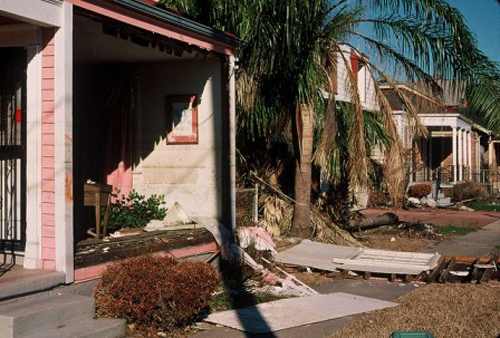 Isaac, Isaac, Isaac…. Better stop. It is unwise to malign anything so powerful. Isaac politely waited more than two years after Haiti’s earthquake for its Caribbean promenade. If the reconstruction funds for Haiti have only managed to build a few luxury hotels for disaster capitalists, it isn’t Isaac’s fault.
Isaac, Isaac, Isaac…. Better stop. It is unwise to malign anything so powerful. Isaac politely waited more than two years after Haiti’s earthquake for its Caribbean promenade. If the reconstruction funds for Haiti have only managed to build a few luxury hotels for disaster capitalists, it isn’t Isaac’s fault.
Isaac became a hurricane just before hitting the mouth of the Mississippi. The insensitive talk of “slamming,” “throttling,” and “thrashing,” liberally used to describe the misfortunes of other people, became muted as the U.S. mainstream news organs learned that the hurricane would come to knock at their own doors in Louisiana and Mississippi. And as U.S. news people receive a lesson in humility, so too does the population. The poor are learning that their government, whatever the party, does not represent them. The middle class is reminded that it is merely one fire or hurricane away from “losing it all.” In the U.S. this means not only the loss of a home, which is the major investment of the middle class, but also the disappearance of documents, heirlooms, memories. A loss akin to being thrown at sea on a raft, deeply grateful to be alive.
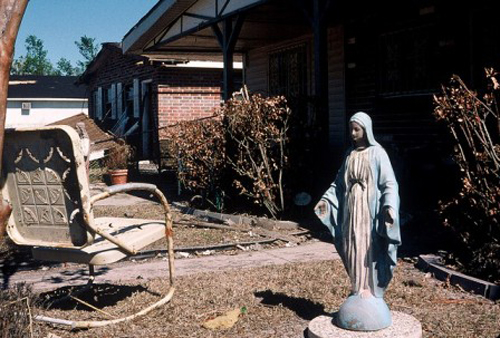 Isaac appears set to revisit Katrina’s old haunts. The timing is identical: midweek, near the end of August. Many who live from paycheck to paycheck, whether they are paid monthly or weekly, will lack the cars of the funds to evade the storm. Will the buses come for them this time? Will the police show more respect for lives than for property this time? Will the levees hold this time? After all, it has been seven years: time enough for reconstruction and even a new culture.
Isaac appears set to revisit Katrina’s old haunts. The timing is identical: midweek, near the end of August. Many who live from paycheck to paycheck, whether they are paid monthly or weekly, will lack the cars of the funds to evade the storm. Will the buses come for them this time? Will the police show more respect for lives than for property this time? Will the levees hold this time? After all, it has been seven years: time enough for reconstruction and even a new culture.
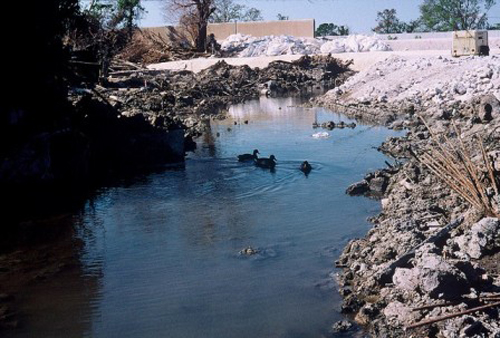 Little has happened during those years, apart from a loss of population from Louisiana, a few lawsuits to punish trigger-happy police officers, and the transfer of some of the Louisiana disaster business to earthquake-hit Haiti. For example, the formaldehyde laden FEMA trailers were sent to Haiti as school buildings. For when the culture change?
Little has happened during those years, apart from a loss of population from Louisiana, a few lawsuits to punish trigger-happy police officers, and the transfer of some of the Louisiana disaster business to earthquake-hit Haiti. For example, the formaldehyde laden FEMA trailers were sent to Haiti as school buildings. For when the culture change?
 Climate change is real, and it is here. Since 1980, the ocean surface temperatures have increased by one degree Celsius, and the amounts of energy involved in warming such massive volumes of water should give pause to anyone with more than half a brain. Hurricanes are powered by warm tropical waters and the Earth’s Coriolis force. Since 2005, scientific studies have predicted that the increased warmth of the ocean’s surface at the tropics would lead to vastly more damaging hurricanes that pack more water and churn farther inland.
Climate change is real, and it is here. Since 1980, the ocean surface temperatures have increased by one degree Celsius, and the amounts of energy involved in warming such massive volumes of water should give pause to anyone with more than half a brain. Hurricanes are powered by warm tropical waters and the Earth’s Coriolis force. Since 2005, scientific studies have predicted that the increased warmth of the ocean’s surface at the tropics would lead to vastly more damaging hurricanes that pack more water and churn farther inland.
As we have seen for Typhoon Gener in the Philippines that caused a spill from a gold mine, or the tsunami in Japan that caused the Fukushima disaster, it is only a matter of time before the effects of climate change become amplified by their interactions with human industries. How long before a direct hit on the Gulf’s oil rigs and refineries by a hurricane? How long before a major hurricane hit on the New York-Boston area and its nuclear power plants?
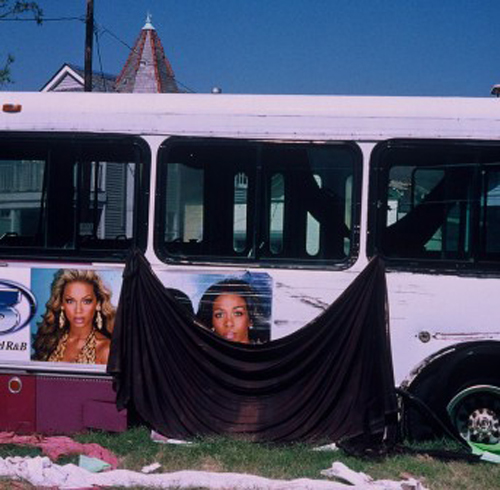 Isaac is in the U.S. now and, however it rearranges the landscape, it can hardly be blamed for coming without notice. It is an extraordinarily gracious giant that sent its calling card seven years ago.
Isaac is in the U.S. now and, however it rearranges the landscape, it can hardly be blamed for coming without notice. It is an extraordinarily gracious giant that sent its calling card seven years ago.
Sources:News Junkie Post
UPDATE 1: Wednesday Aug 29, 12:30 EST. Hurricane Isaac is churning over Louisiana and Mississippi with sustained winds of 75 mph while moving at only 6 mph and dumping as much as 20 inches of rain in some places. For more details, go to National Hurricane Center (NHC).
UPDATE 2, Friday Aug 31, 00:02 EST. According to RT, Isaac’s ravages in Louisiana and Mississippi killed at least three, including two people whose bodies were found in the kitchen of a flooded house in Louisiana’s Plaquemines Parish, and a truck driver in Mississippi who died when a tree fell on him.
VIDEO: US floods in Isaac’s aftermath (1 1/2 min; source: RT).
ing over Louisiana and Mississippi with sustained winds of 75 mph while moving at only 6 mph and dumping as much as 20 inches of rain in some places. For more details, go to National Hurricane Center (NHC).
By Dady Chery
News Junkie Post
Like a hulking giant, Isaac has stomped across the Caribbean at practically human speed, for days. Ten miles per hour, 14 mph, and Isaac continues its march northwest and west-northwest, for nearly one week, as if for a rendez-vous. With whom?
Haiti could not have been tapped more gently, although at least 24 people have died. The propaganda is in full swing to credit Isaac with the collapsed Haitian agriculture on which USAID has labored for years. No. Give credit where credit is due. USAID should take a bow.
A possible resurgence of cholera is also being predicted from Isaac’s passage, although this is hardly the logical outcome of a tropical storm that has brought Haiti a gift of vast quantities of naturally distilled water. If cholera reappears, it will most likely be due to the contamination of the country’s waters with hospital wastes or the sale of uninspected emergency bottled water to the population.
 Isaac, Isaac, Isaac…. Better stop. It is unwise to malign anything so powerful. Isaac politely waited more than two years after Haiti’s earthquake for its Caribbean promenade. If the reconstruction funds for Haiti have only managed to build a few luxury hotels for disaster capitalists, it isn’t Isaac’s fault.
Isaac, Isaac, Isaac…. Better stop. It is unwise to malign anything so powerful. Isaac politely waited more than two years after Haiti’s earthquake for its Caribbean promenade. If the reconstruction funds for Haiti have only managed to build a few luxury hotels for disaster capitalists, it isn’t Isaac’s fault.
Isaac became a hurricane just before hitting the mouth of the Mississippi. The insensitive talk of “slamming,” “throttling,” and “thrashing,” liberally used to describe the misfortunes of other people, became muted as the U.S. mainstream news organs learned that the hurricane would come to knock at their own doors in Louisiana and Mississippi. And as U.S. news people receive a lesson in humility, so too does the population. The poor are learning that their government, whatever the party, does not represent them. The middle class is reminded that it is merely one fire or hurricane away from “losing it all.” In the U.S. this means not only the loss of a home, which is the major investment of the middle class, but also the disappearance of documents, heirlooms, memories. A loss akin to being thrown at sea on a raft, deeply grateful to be alive.
 Isaac appears set to revisit Katrina’s old haunts. The timing is identical: midweek, near the end of August. Many who live from paycheck to paycheck, whether they are paid monthly or weekly, will lack the cars of the funds to evade the storm. Will the buses come for them this time? Will the police show more respect for lives than for property this time? Will the levees hold this time? After all, it has been seven years: time enough for reconstruction and even a new culture.
Isaac appears set to revisit Katrina’s old haunts. The timing is identical: midweek, near the end of August. Many who live from paycheck to paycheck, whether they are paid monthly or weekly, will lack the cars of the funds to evade the storm. Will the buses come for them this time? Will the police show more respect for lives than for property this time? Will the levees hold this time? After all, it has been seven years: time enough for reconstruction and even a new culture.
 Little has happened during those years, apart from a loss of population from Louisiana, a few lawsuits to punish trigger-happy police officers, and the transfer of some of the Louisiana disaster business to earthquake-hit Haiti. For example, the formaldehyde laden FEMA trailers were sent to Haiti as school buildings. For when the culture change?
Little has happened during those years, apart from a loss of population from Louisiana, a few lawsuits to punish trigger-happy police officers, and the transfer of some of the Louisiana disaster business to earthquake-hit Haiti. For example, the formaldehyde laden FEMA trailers were sent to Haiti as school buildings. For when the culture change?
 Climate change is real, and it is here. The ocean surface temperatures have increased by one degree Celsius, and the amounts of energy involved in warming such massive volumes of water should give pause to anyone with more than half a brain. Hurricanes are powered by warm tropical waters and the Earth’s Coriolis force. Since 2005, scientific studies have predicted that the increased warmth of the ocean’s surface at the tropics would lead to vastly more damaging hurricanes that pack more water and churn farther inland.
Climate change is real, and it is here. The ocean surface temperatures have increased by one degree Celsius, and the amounts of energy involved in warming such massive volumes of water should give pause to anyone with more than half a brain. Hurricanes are powered by warm tropical waters and the Earth’s Coriolis force. Since 2005, scientific studies have predicted that the increased warmth of the ocean’s surface at the tropics would lead to vastly more damaging hurricanes that pack more water and churn farther inland.
As we have seen for Typhoon Gener in the Philippines, which caused a spill from a gold mine, or the tsunami in Japan that caused the Fukushima disaster, it is only a matter of time before the effects of climate change become amplified by their interactions with human industries. How long before a direct hit on the Gulf’s oil rigs and refineries by a hurricane? How long before a major hurricane hit on the New York-Boston area and its nuclear power plants?
 Isaac is in the U.S. now and, however it rearranges the landscape, it can hardly be blamed for coming without notice. It is an extraordinarily gracious giant that sent its calling card seven years ago.
Isaac is in the U.S. now and, however it rearranges the landscape, it can hardly be blamed for coming without notice. It is an extraordinarily gracious giant that sent its calling card seven years ago.
Dady Chery is a journalist, playwright, essayist and poet, who writes in English, French and her native Creole. She is the Editor of Haiti Chery. All photographs of New Orleans post Katrina are by Gilbert Mercier.
UPDATE 1: Wednesday Aug 29, 12:30 EST. Hurricane Isaac is churning over Louisiana and Mississippi with sustained winds of 75 mph while moving at only 6 mph and dumping as much as 20 inches of rain in some places. For more details, go to National Hurricane Center (NHC).
By Dady Chery
News Junkie Post
Like a hulking giant, Isaac has stomped across the Caribbean at practically human speed, for days. Ten miles per hour, 14 mph, and Isaac continues its march northwest and west-northwest, for nearly one week, as if for a rendez-vous. With whom?
Haiti could not have been tapped more gently, although at least 24 people have died. The propaganda is in full swing to credit Isaac with the collapsed Haitian agriculture on which USAID has labored for years. No. Give credit where credit is due. USAID should take a bow.
A possible resurgence of cholera is also being predicted from Isaac’s passage, although this is hardly the logical outcome of a tropical storm that has brought Haiti a gift of vast quantities of naturally distilled water. If cholera reappears, it will most likely be due to the contamination of the country’s waters with hospital wastes or the sale of uninspected emergency bottled water to the population.
 Isaac, Isaac, Isaac…. Better stop. It is unwise to malign anything so powerful. Isaac politely waited more than two years after Haiti’s earthquake for its Caribbean promenade. If the reconstruction funds for Haiti have only managed to build a few luxury hotels for disaster capitalists, it isn’t Isaac’s fault.
Isaac, Isaac, Isaac…. Better stop. It is unwise to malign anything so powerful. Isaac politely waited more than two years after Haiti’s earthquake for its Caribbean promenade. If the reconstruction funds for Haiti have only managed to build a few luxury hotels for disaster capitalists, it isn’t Isaac’s fault.
Isaac became a hurricane just before hitting the mouth of the Mississippi. The insensitive talk of “slamming,” “throttling,” and “thrashing,” liberally used to describe the misfortunes of other people, became muted as the U.S. mainstream news organs learned that the hurricane would come to knock at their own doors in Louisiana and Mississippi. And as U.S. news people receive a lesson in humility, so too does the population. The poor are learning that their government, whatever the party, does not represent them. The middle class is reminded that it is merely one fire or hurricane away from “losing it all.” In the U.S. this means not only the loss of a home, which is the major investment of the middle class, but also the disappearance of documents, heirlooms, memories. A loss akin to being thrown at sea on a raft, deeply grateful to be alive.
 Isaac appears set to revisit Katrina’s old haunts. The timing is identical: midweek, near the end of August. Many who live from paycheck to paycheck, whether they are paid monthly or weekly, will lack the cars of the funds to evade the storm. Will the buses come for them this time? Will the police show more respect for lives than for property this time? Will the levees hold this time? After all, it has been seven years: time enough for reconstruction and even a new culture.
Isaac appears set to revisit Katrina’s old haunts. The timing is identical: midweek, near the end of August. Many who live from paycheck to paycheck, whether they are paid monthly or weekly, will lack the cars of the funds to evade the storm. Will the buses come for them this time? Will the police show more respect for lives than for property this time? Will the levees hold this time? After all, it has been seven years: time enough for reconstruction and even a new culture.
 Little has happened during those years, apart from a loss of population from Louisiana, a few lawsuits to punish trigger-happy police officers, and the transfer of some of the Louisiana disaster business to earthquake-hit Haiti. For example, the formaldehyde laden FEMA trailers were sent to Haiti as school buildings. For when the culture change?
Little has happened during those years, apart from a loss of population from Louisiana, a few lawsuits to punish trigger-happy police officers, and the transfer of some of the Louisiana disaster business to earthquake-hit Haiti. For example, the formaldehyde laden FEMA trailers were sent to Haiti as school buildings. For when the culture change?
 Climate change is real, and it is here. The ocean surface temperatures have increased by one degree Celsius, and the amounts of energy involved in warming such massive volumes of water should give pause to anyone with more than half a brain. Hurricanes are powered by warm tropical waters and the Earth’s Coriolis force. Since 2005, scientific studies have predicted that the increased warmth of the ocean’s surface at the tropics would lead to vastly more damaging hurricanes that pack more water and churn farther inland.
Climate change is real, and it is here. The ocean surface temperatures have increased by one degree Celsius, and the amounts of energy involved in warming such massive volumes of water should give pause to anyone with more than half a brain. Hurricanes are powered by warm tropical waters and the Earth’s Coriolis force. Since 2005, scientific studies have predicted that the increased warmth of the ocean’s surface at the tropics would lead to vastly more damaging hurricanes that pack more water and churn farther inland.
As we have seen for Typhoon Gener in the Philippines, which caused a spill from a gold mine, or the tsunami in Japan that caused the Fukushima disaster, it is only a matter of time before the effects of climate change become amplified by their interactions with human industries. How long before a direct hit on the Gulf’s oil rigs and refineries by a hurricane? How long before a major hurricane hit on the New York-Boston area and its nuclear power plants?
 Isaac is in the U.S. now and, however it rearranges the landscape, it can hardly be blamed for coming without notice. It is an extraordinarily gracious giant that sent its calling card seven years ago.
Isaac is in the U.S. now and, however it rearranges the landscape, it can hardly be blamed for coming without notice. It is an extraordinarily gracious giant that sent its calling card seven years ago.
Dady Chery is a journalist, playwright, essayist and poet, who writes in English, French and her native Creole. She is the Editor of Haiti Chery. All photographs of New Orleans post Katrina are by Gilbert Mercier.
UPDATE 1: Wednesday Aug 29, 12:30 EST. Hurricane Isaac is churning over Louisiana and Mississippi with sustained winds of 75 mph while moving at only 6 mph and dumping as much as 20 inches of rain in some places. For more details, go to National Hurricane Center (NHC).

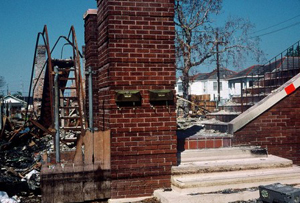

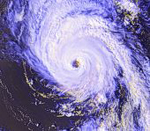


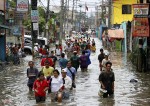


Comments
Isaac, Gener and Katrina: Climate Change in Action — No Comments